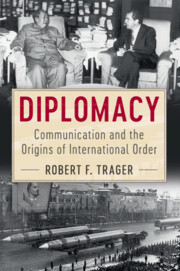Book contents
- Frontmatter
- Dedication
- Contents
- List of Figures
- List of Tables
- Preface
- 1 Can Adversaries Communicate?
- 2 How Perceptions of Intentions Form
- PART I THEORY
- 3 The Scope of Demands
- 4 The Risk of a Breach
- 5 Balancing Allies and Adversaries
- 6 Diplomatic Approaches
- PART II EMPIRICAL ANALYSIS
- APPENDICES
- References
- Index
3 - The Scope of Demands
from PART I - THEORY
Published online by Cambridge University Press: 25 October 2017
- Frontmatter
- Dedication
- Contents
- List of Figures
- List of Tables
- Preface
- 1 Can Adversaries Communicate?
- 2 How Perceptions of Intentions Form
- PART I THEORY
- 3 The Scope of Demands
- 4 The Risk of a Breach
- 5 Balancing Allies and Adversaries
- 6 Diplomatic Approaches
- PART II EMPIRICAL ANALYSIS
- APPENDICES
- References
- Index
Summary
When the kingdom of Piedmont-Sardinia dreamt of forming Italy in 1859, it set about forging a secret alliance with France, inspiring insurrections in Austria's Italian provinces, and conducting military maneuvers close to the Austrian border. The Austrians mobilized in response and war appeared likely. A compromise proposal was floated by the Powers according to which the Austrians would pull their troops back from the boarder in return for Piedmontese demobilization. In private diplomatic communications, the Austrians rejected this compromise, insisting the Piedmontese demobilize first. In cases such as this, costless communication is difficult, and is often thought to be impossible. All parties knew what the Austrians wanted; what they did not know initially was whether Austria was willing to fight rather than accept a compromise. Why should words uttered in private convince anyone? Austria had incentive to make the more substantial demand even if it were not willing to fight over the matter. But nevertheless, observers did learn from the Austrian refusal. The British ambassador to Austria even concluded that he had “not the smallest hope that the Austrian Government will agree to any such [compromise].” How did observers reach this conclusion?
The ambassador may have drawn this inference because he believed that Austria, having made the threat, would not have wanted to be caught in a bluff, but this could be said of every threat and diplomats sometimes believe that threats lack credibility. Although a range of factors certainly affected the ambassador's conclusion, he likely made the following simple inference: in demanding more, Austria had given up the opportunity to achieve a compromise solution that Austria believed Piedmont was much more likely to have conceded without fighting; therefore, Austria is resolved to fight for the more substantial demand. Through this mechanism, the scope of state demands commonly conveys information about resolve to adversaries in international politics.
Despite literature in international relations that argues the contrary, such simple inferences are often quite rational in diplomatic relations. This chapter analyzes a model similar to Fearon (1995) in order to demonstrate that higher demands can increase perceptions of a state's resolve to fight for more favorable outcomes when two conditions hold. First, when negotiations produce a peaceful outcome, both sides must share in the bargaining surplus from avoiding war.
- Type
- Chapter
- Information
- DiplomacyCommunication and the Origins of International Order, pp. 47 - 70Publisher: Cambridge University PressPrint publication year: 2017



